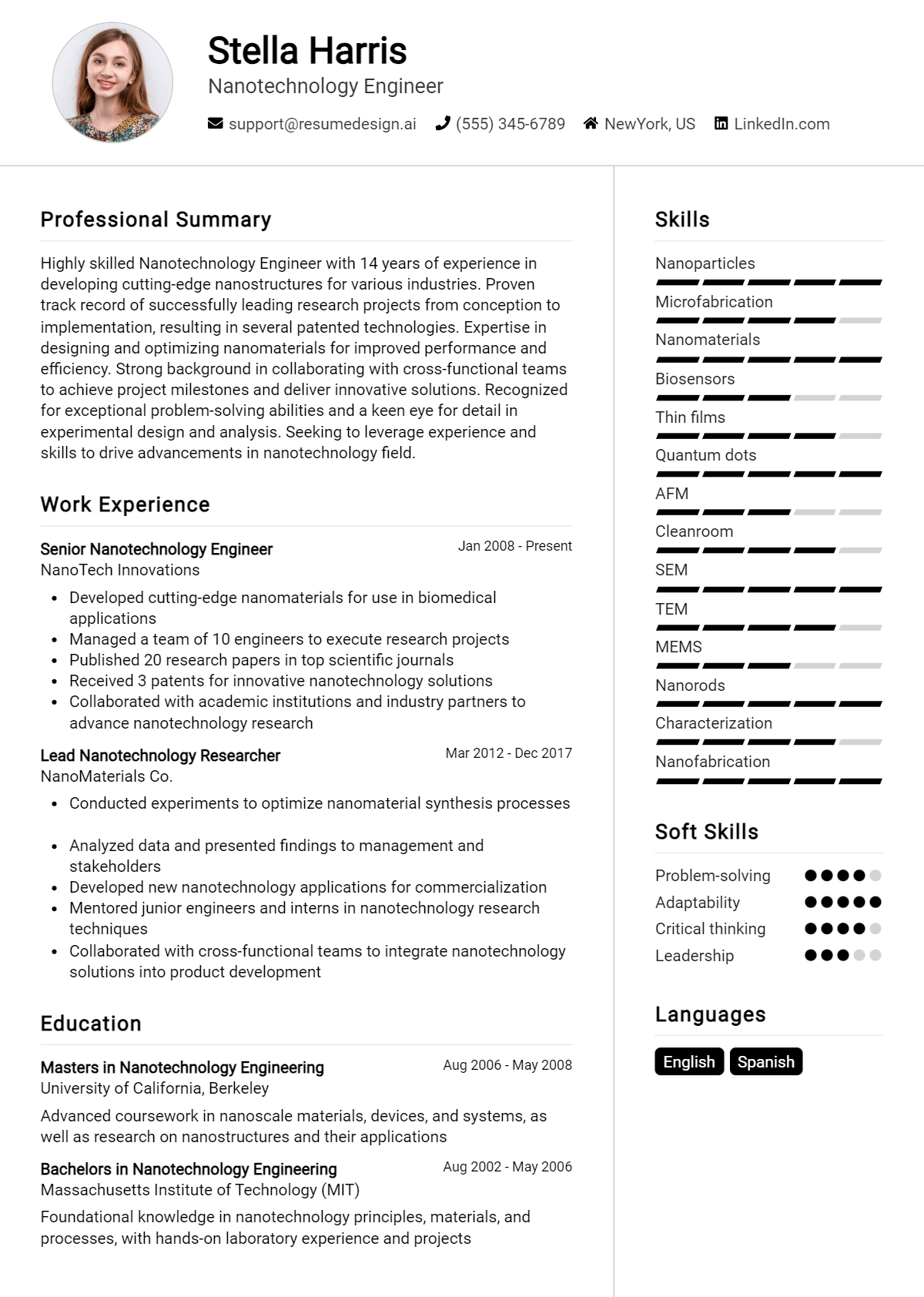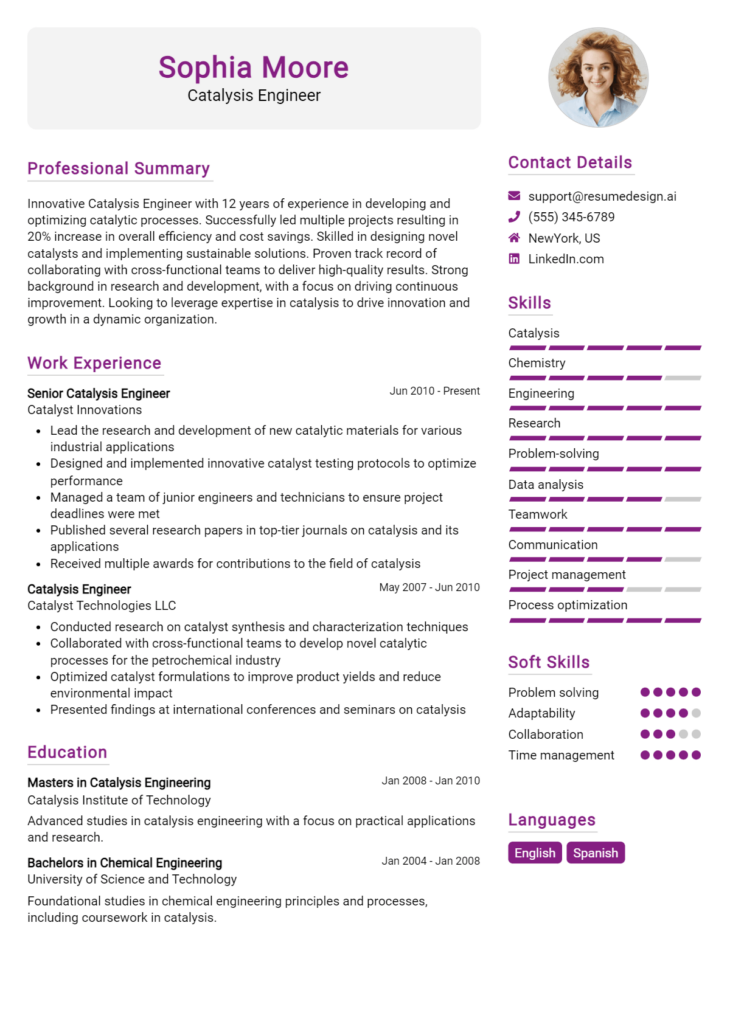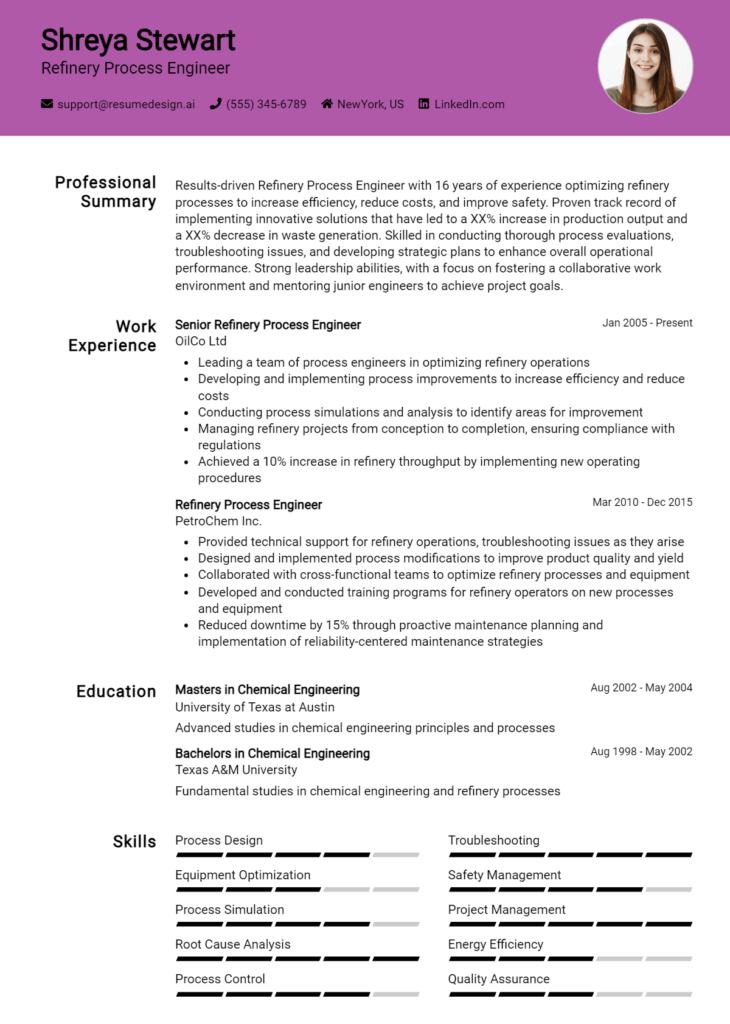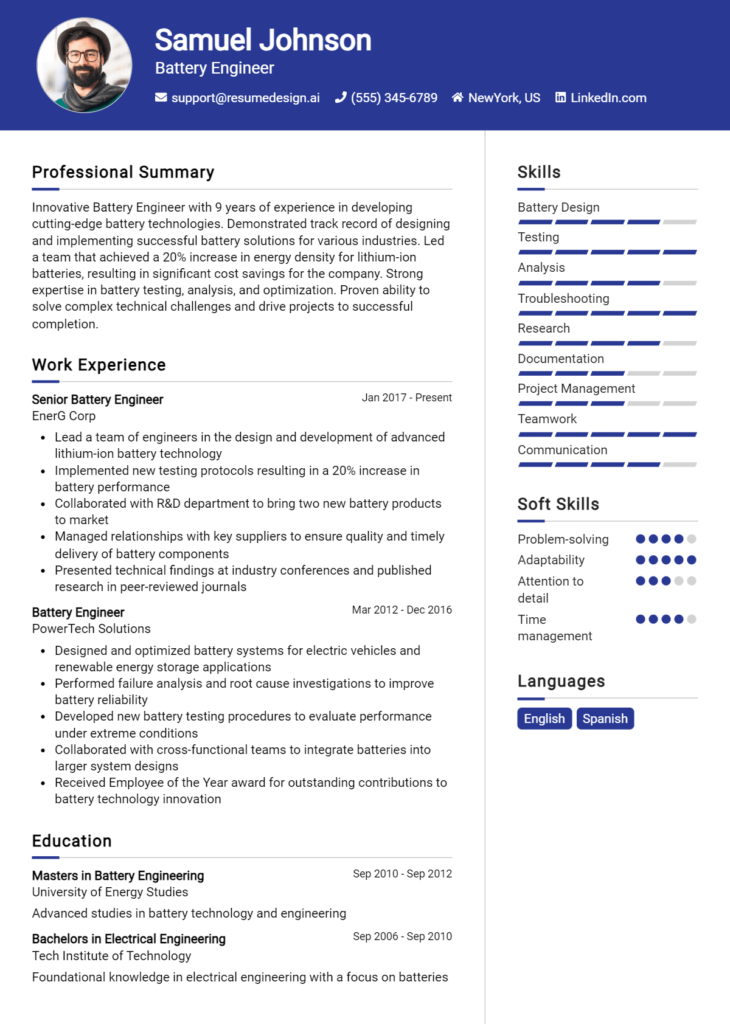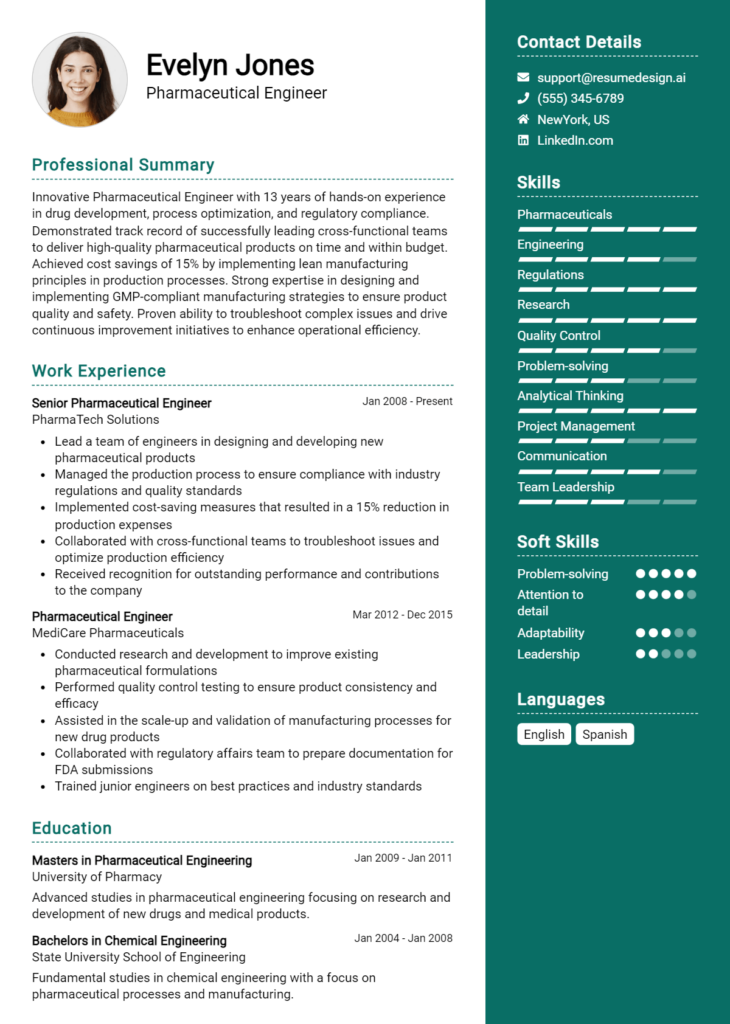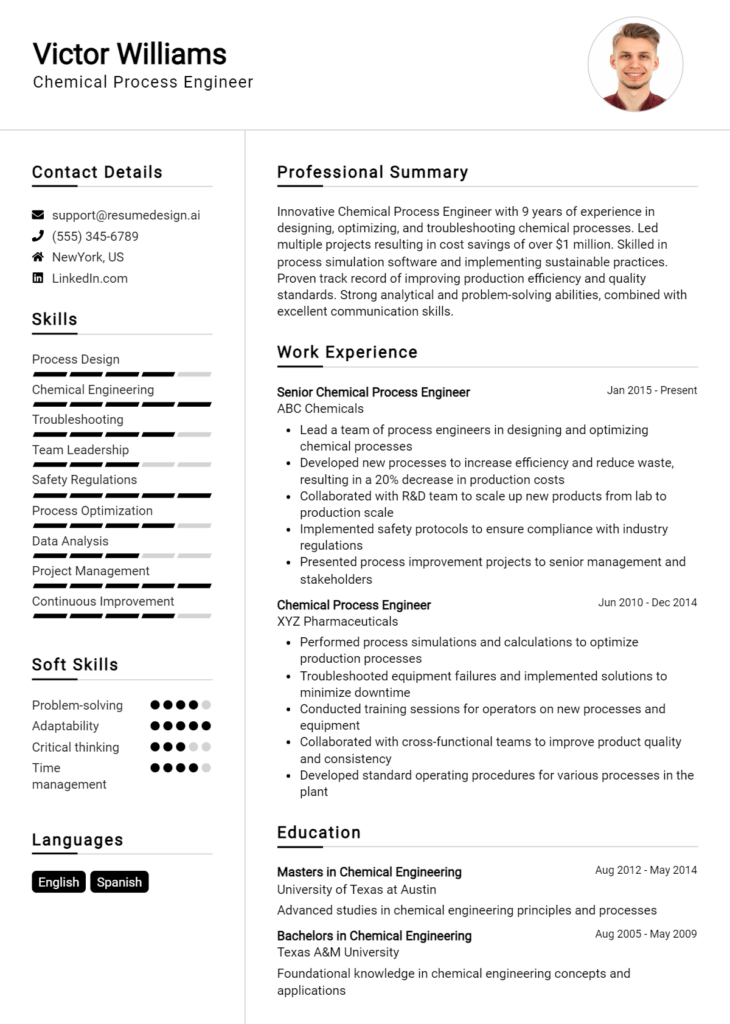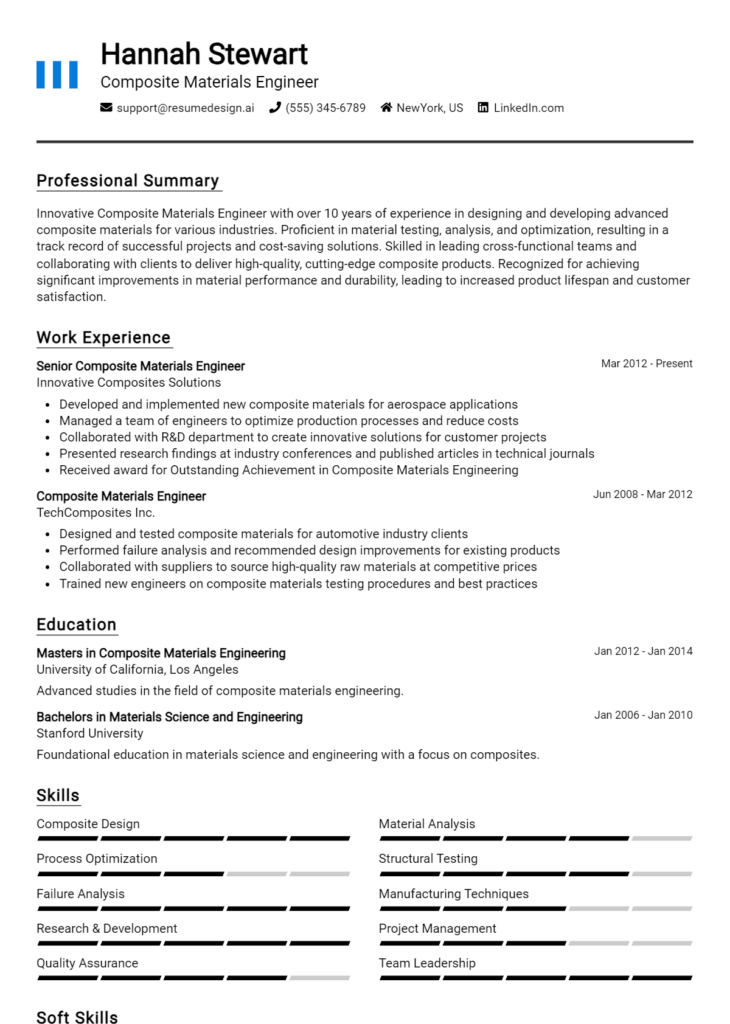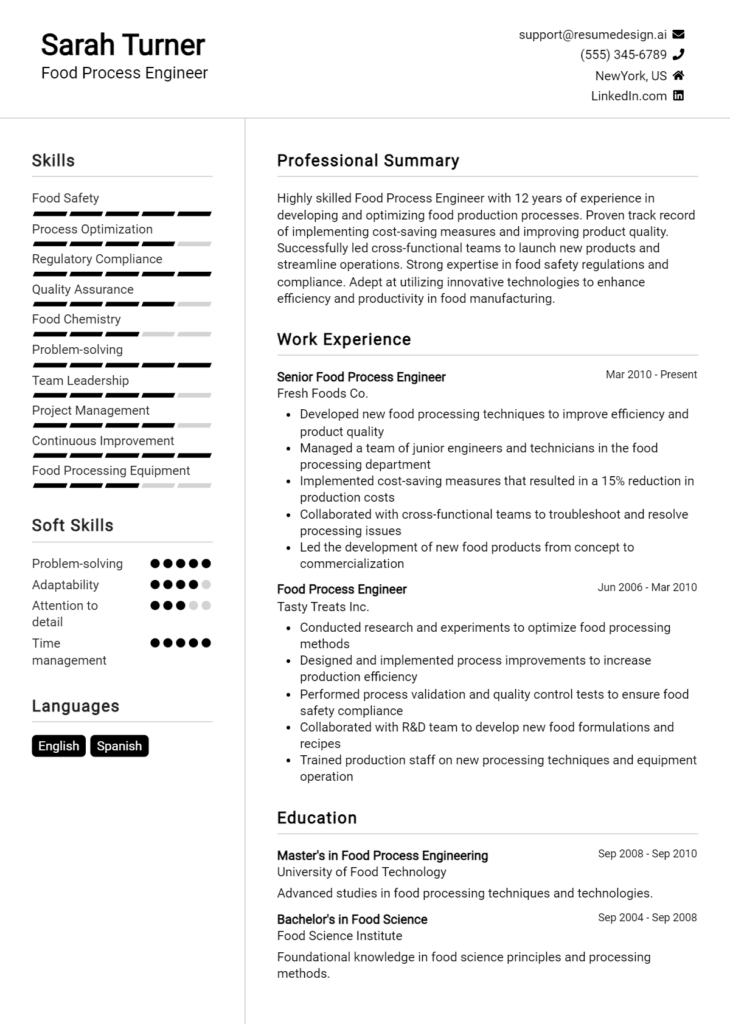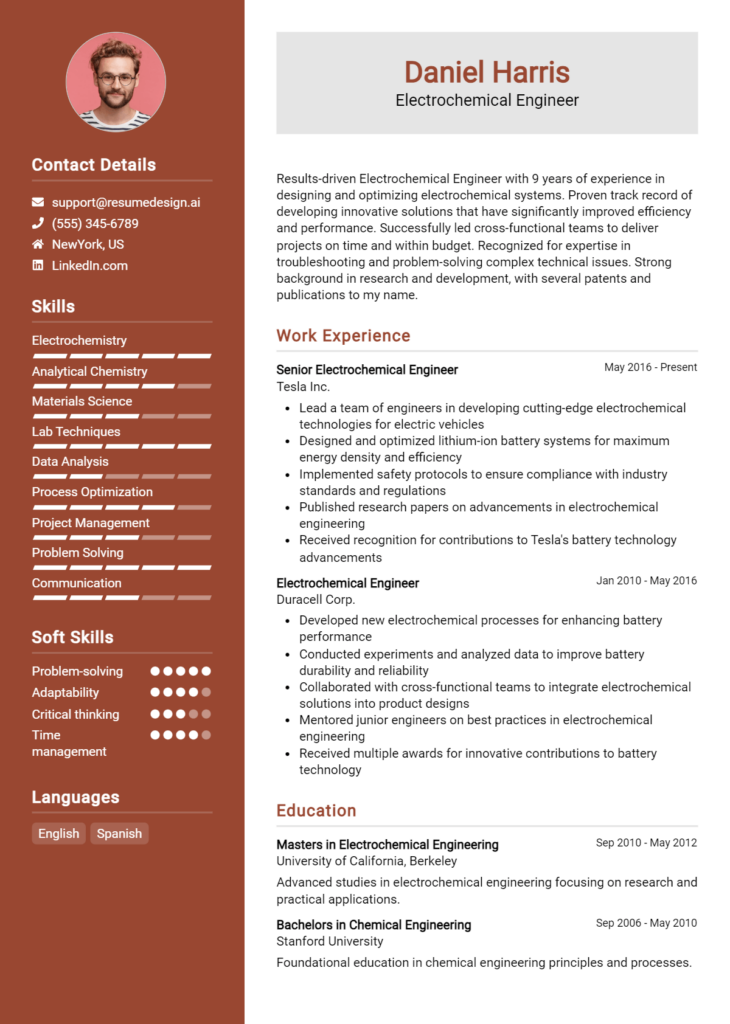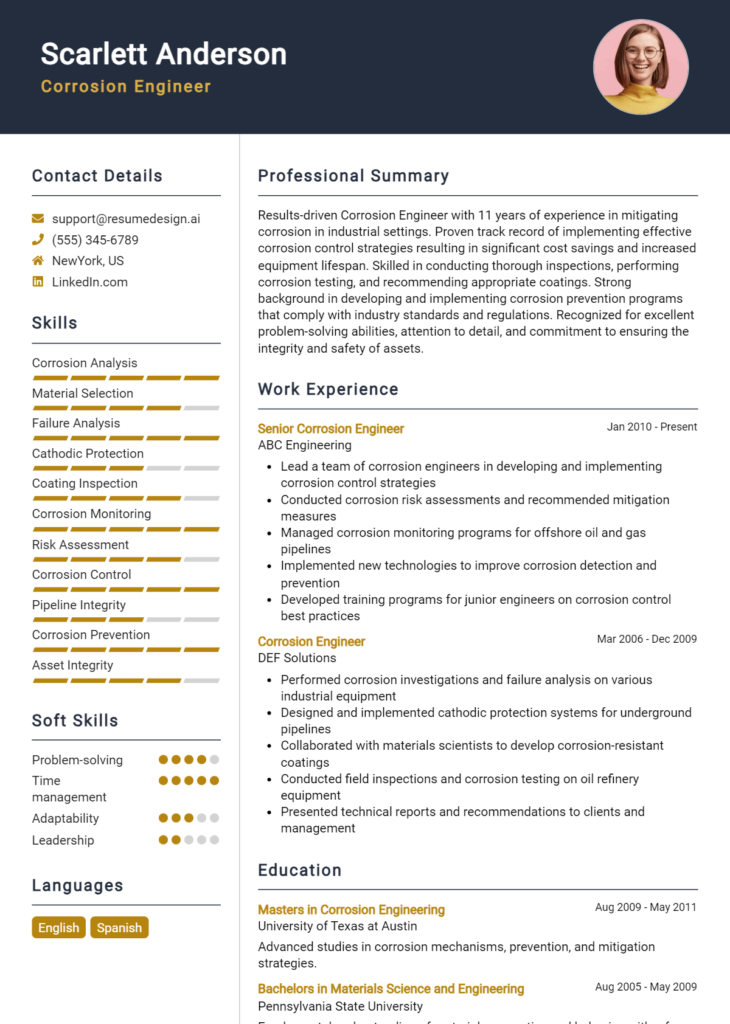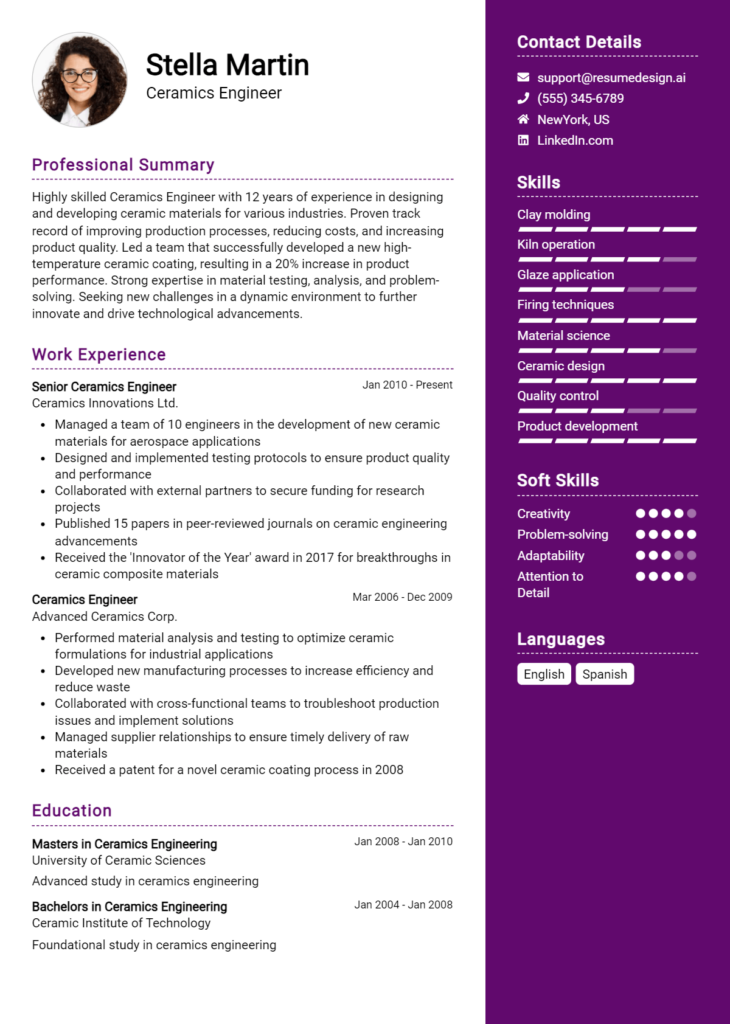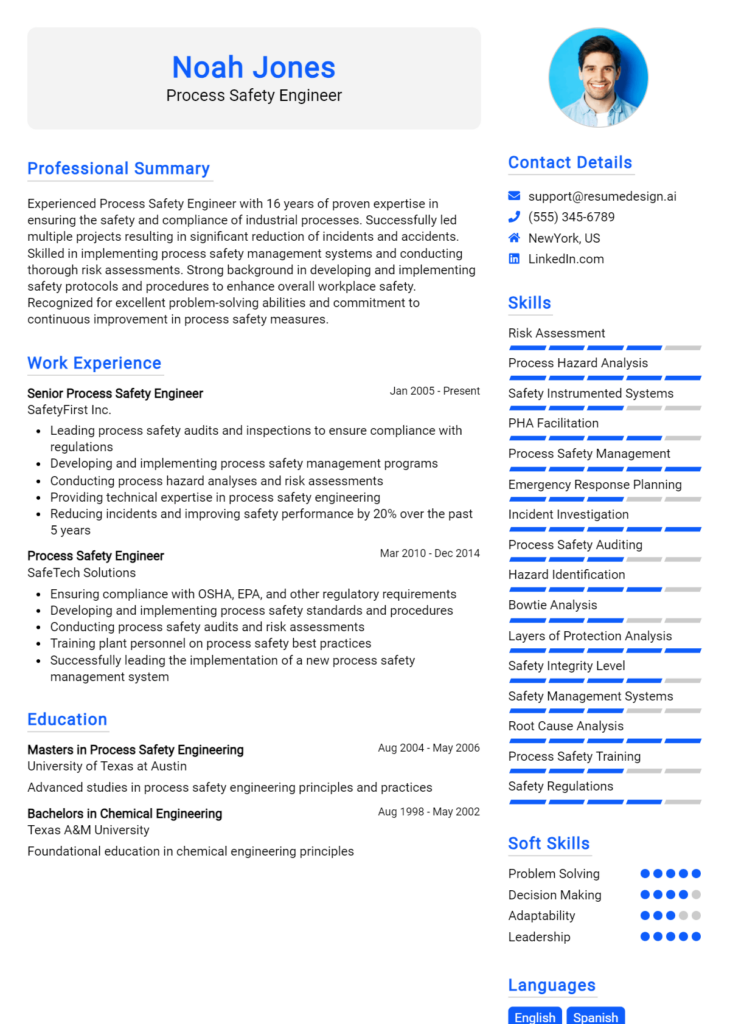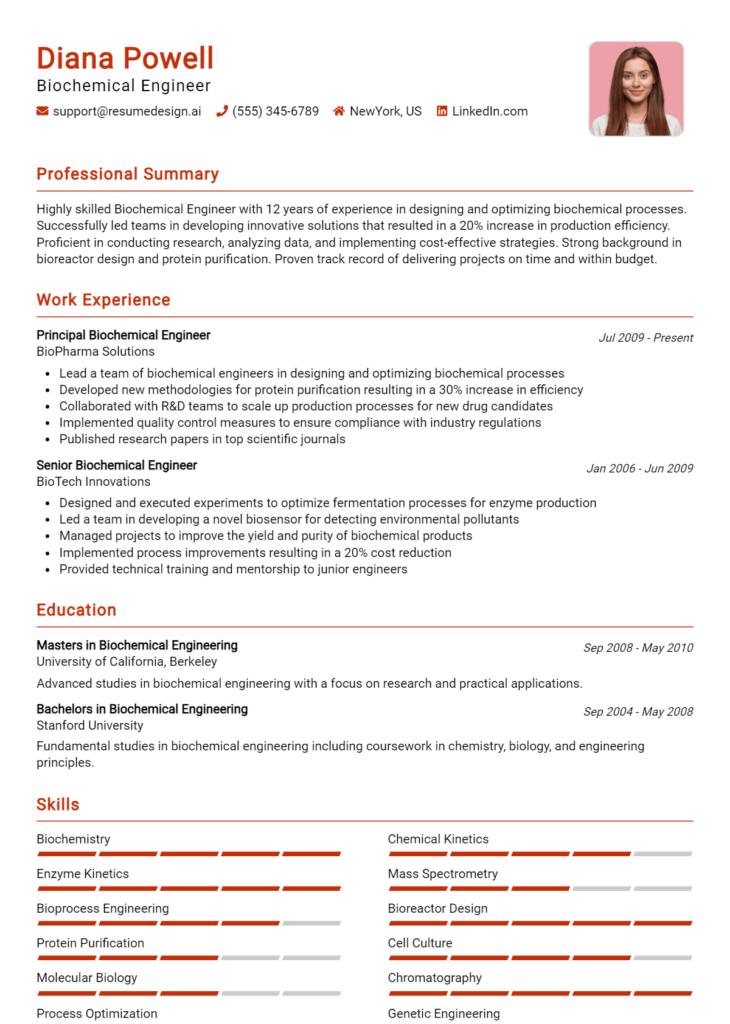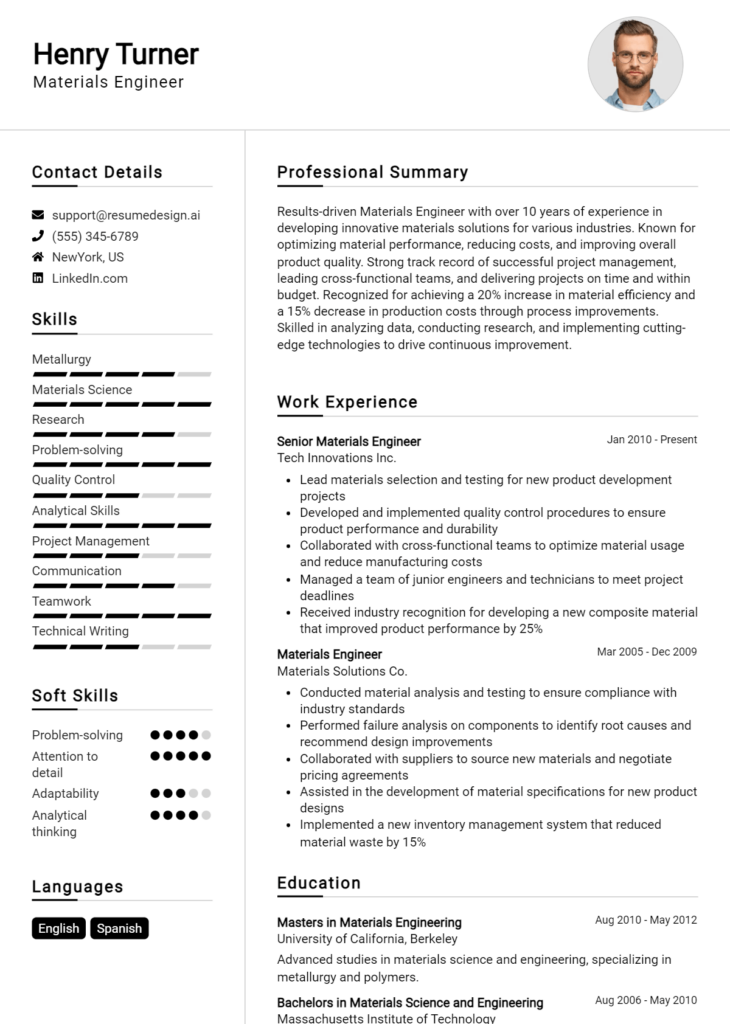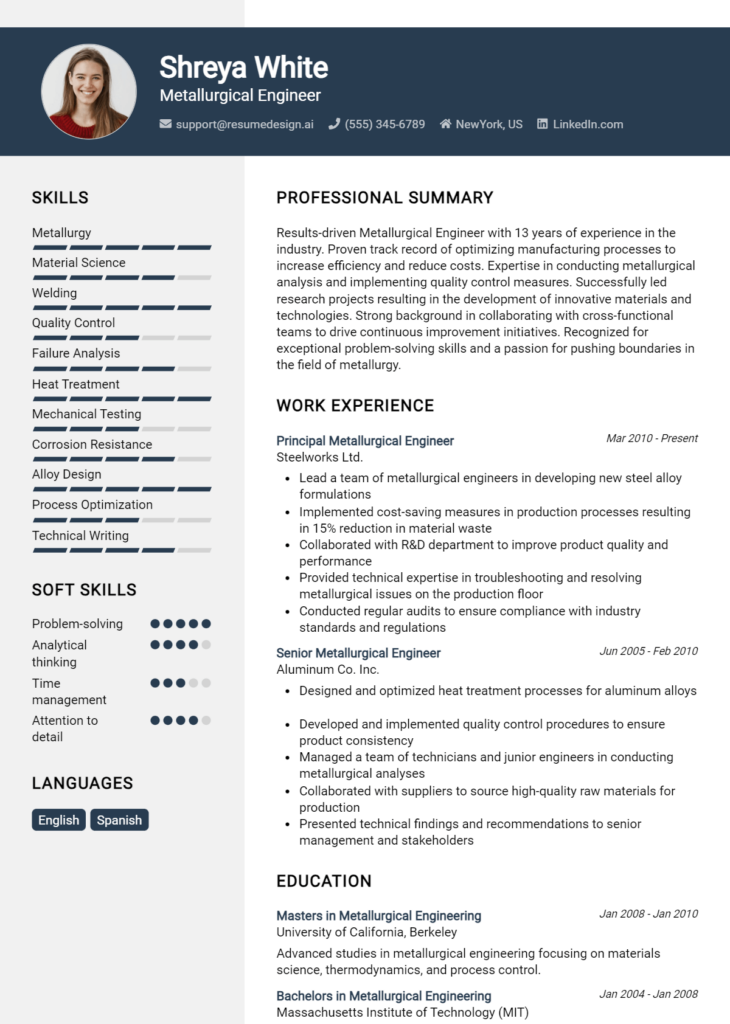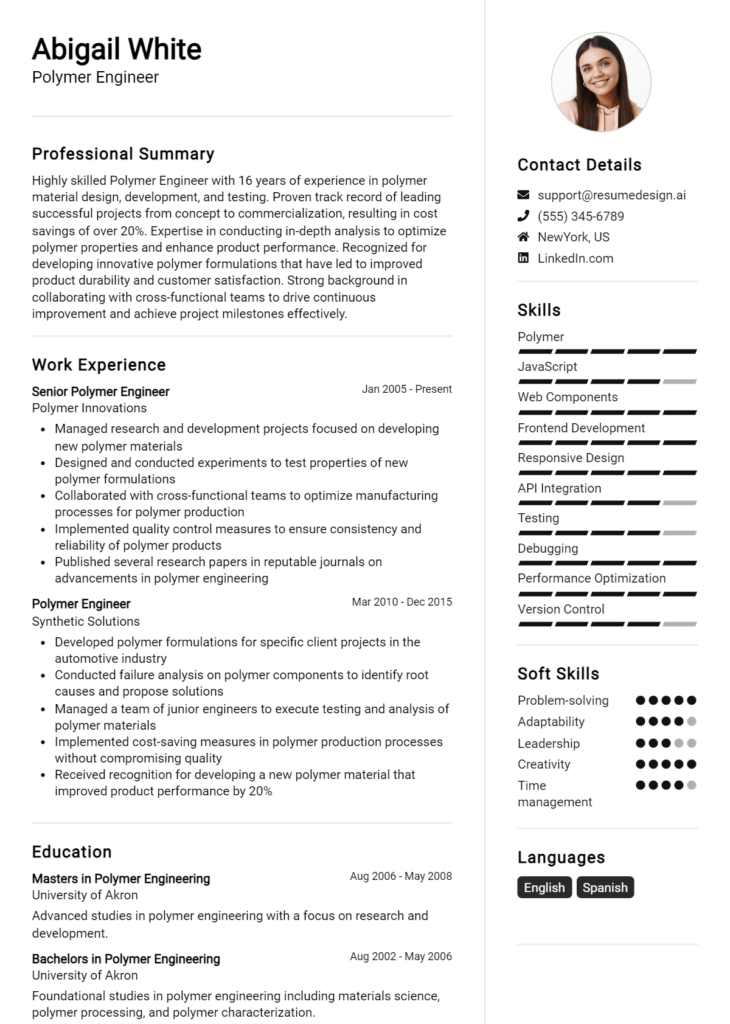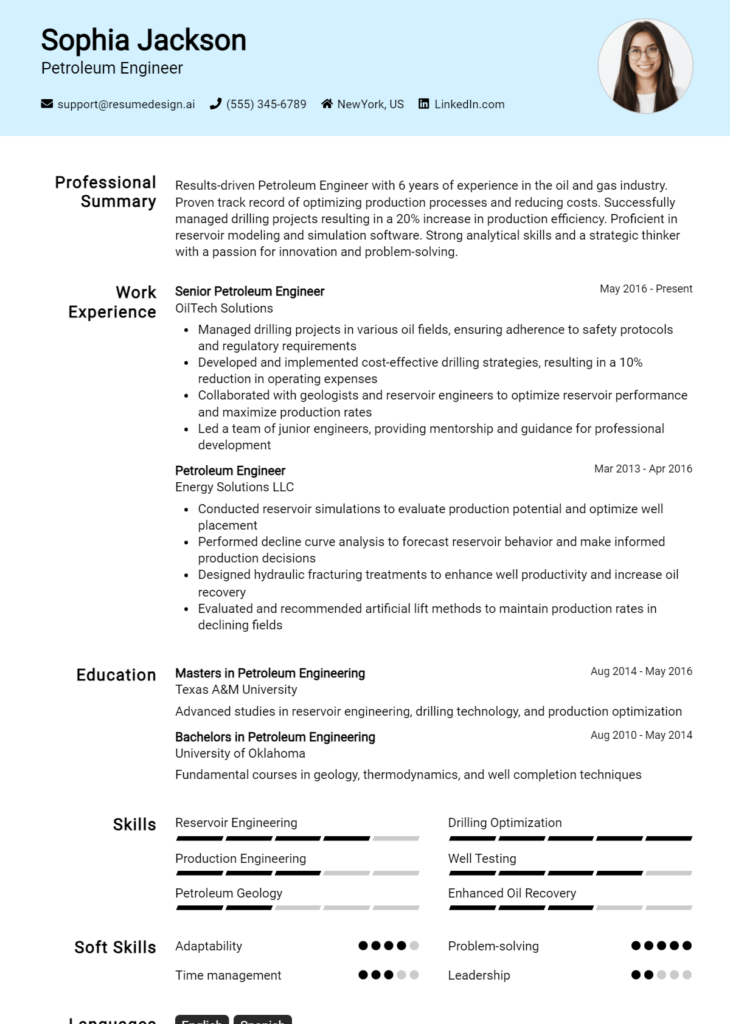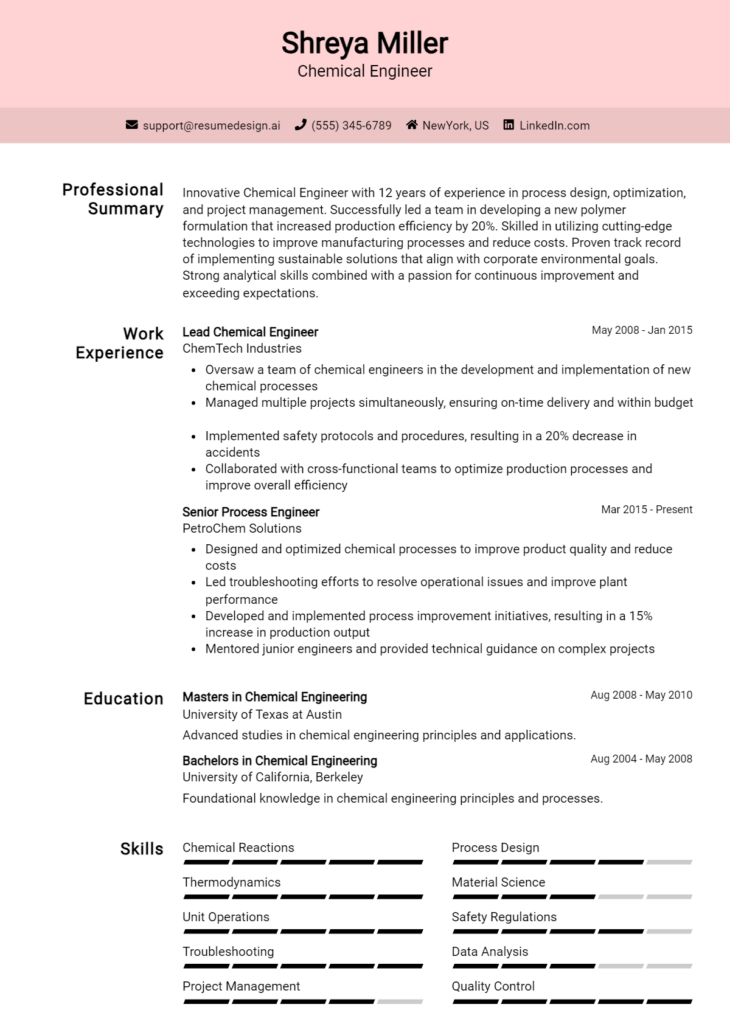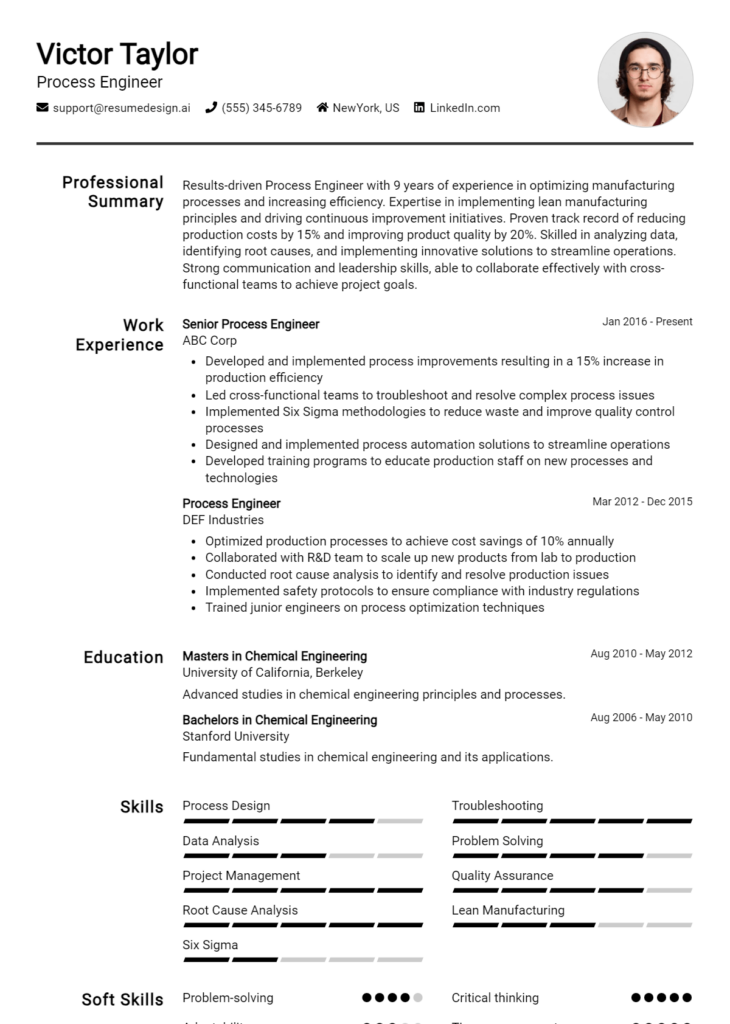Nanotechnology Engineer Core Responsibilities
A Nanotechnology Engineer plays a pivotal role in advancing technology by manipulating materials at the nanoscale. Key responsibilities include conducting research, developing nanomaterials, and collaborating with cross-functional teams such as chemistry, engineering, and manufacturing. Essential skills encompass technical proficiency, operational efficiency, and robust problem-solving abilities. These competencies are crucial in meeting organizational objectives and driving innovation. A well-structured resume effectively highlights these qualifications, ensuring potential employers recognize the engineer's valuable contributions.
Common Responsibilities Listed on Nanotechnology Engineer Resume
- Conducting research on nanomaterials and their applications.
- Designing and synthesizing nanostructures for various technologies.
- Collaborating with interdisciplinary teams to develop innovative solutions.
- Performing characterization and analysis of nanoscale materials.
- Implementing quality control measures in nanotechnology processes.
- Developing and optimizing manufacturing processes for nanomaterials.
- Preparing technical reports and presentations for stakeholders.
- Staying updated on advancements in nanotechnology research.
- Ensuring compliance with safety and environmental regulations.
- Conducting experiments and analyzing data to solve complex problems.
- Participating in project management and strategic planning initiatives.
- Training and mentoring junior engineers and technicians.
High-Level Resume Tips for Nanotechnology Engineer Professionals
In the competitive field of nanotechnology, a well-crafted resume is an essential tool for professionals seeking to make a significant impact in their careers. Your resume often serves as the first impression you make on a potential employer, and it is crucial that it effectively reflects your unique skills and achievements. A compelling resume can set you apart in a field that demands precision, innovation, and technical expertise. This guide will provide practical and actionable resume tips specifically tailored for Nanotechnology Engineer professionals, ensuring you present yourself in the best possible light to potential employers.
Top Resume Tips for Nanotechnology Engineer Professionals
- Tailor your resume to match the job description by highlighting relevant skills and experiences that align with the specific requirements of the position.
- Showcase your technical expertise in nanotechnology by detailing your knowledge of nanomaterials, fabrication techniques, and characterization methods.
- Quantify your achievements to demonstrate your impact, such as mentioning the percentage increase in efficiency or reduction in costs due to your contributions.
- Include any relevant certifications or training that showcase your commitment to staying current in the rapidly evolving field of nanotechnology.
- Highlight your experience with interdisciplinary collaboration, as nanotechnology often intersects with various fields, such as materials science, biology, and engineering.
- Utilize industry-specific keywords to enhance your resume’s visibility in applicant tracking systems (ATS) and to resonate with hiring managers.
- Include a concise summary or objective at the beginning of your resume that clearly outlines your career goals and what you bring to the table as a nanotechnology engineer.
- Demonstrate your problem-solving abilities by including examples of challenges you faced and how you addressed them using innovative approaches.
- Add any publications, patents, or conference presentations that can highlight your contributions to the field and establish your credibility as an expert.
By implementing these tips, you can significantly increase your chances of landing a job in the Nanotechnology Engineer field. A well-structured and tailored resume not only showcases your qualifications but also demonstrates your commitment to the profession, making you a more attractive candidate to potential employers.
Why Resume Headlines & Titles are Important for Nanotechnology Engineer
In the competitive field of nanotechnology, a well-crafted resume headline or title plays a crucial role in capturing the attention of hiring managers. A strong headline serves as a quick summary of a candidate's key qualifications and expertise, presenting their unique value proposition in a concise and impactful manner. Given the specialized nature of this field, a resume headline should be relevant to the specific job being applied for, allowing candidates to stand out among a sea of applicants. By distilling their strengths into a single phrase, candidates can effectively communicate their potential contributions to prospective employers, making the resume more compelling right from the start.
Best Practices for Crafting Resume Headlines for Nanotechnology Engineer
- Keep it concise: Aim for a headline that is no longer than 10-12 words.
- Be specific: Use terminology that is relevant to nanotechnology and the specific role.
- Highlight key qualifications: Focus on skills, experience, or achievements that set you apart.
- Use action-oriented language: Choose powerful verbs that convey your capabilities.
- Tailor to the job: Adjust your headlines based on the job description and requirements.
- Incorporate industry keywords: Utilize relevant keywords that can enhance visibility in applicant tracking systems.
- Avoid jargon: Ensure the headline is understandable to a broader audience, including HR personnel.
- Showcase your unique selling proposition: What makes you the ideal candidate for the position?
Example Resume Headlines for Nanotechnology Engineer
Strong Resume Headlines
Innovative Nanotechnology Engineer with 5+ Years in Advanced Materials Development
Results-Driven Nanotechnology Specialist Skilled in Nanomaterials Synthesis and Characterization
Experienced Nanotechnology Researcher with Proven Success in Collaborative R&D Projects
Dynamic Nanotechnology Engineer Focused on Sustainable Solutions and Green Chemistry
Weak Resume Headlines
Nanotechnology Engineer Looking for a Job
Engineer with Experience in Nanotechnology
The strong resume headlines are effective because they immediately convey specific expertise and substantial experience relevant to the nanotechnology field, engaging the reader and encouraging them to explore the resume further. In contrast, the weak headlines lack specificity and fail to communicate the candidate's unique qualifications or strengths, making them forgettable and less impactful. A well-crafted headline can significantly influence a hiring manager's first impression, highlighting why it's essential for candidates to invest time in creating compelling titles for their resumes.
Writing an Exceptional Nanotechnology Engineer Resume Summary
A well-crafted resume summary is crucial for a Nanotechnology Engineer as it serves as the first impression for hiring managers. This brief introduction quickly highlights the candidate's key skills, relevant experience, and notable accomplishments, allowing them to stand out in a competitive job market. A strong summary should be concise yet impactful, tailored specifically to the job being applied for, and designed to grab the attention of recruiters who often skim through numerous resumes. By effectively summarizing qualifications, candidates can set the tone for the rest of their resume and increase their chances of landing an interview.
Best Practices for Writing a Nanotechnology Engineer Resume Summary
- Quantify achievements: Use numbers to demonstrate the impact of your work, such as increases in efficiency or reductions in costs.
- Focus on skills: Highlight specific technical skills that are relevant to nanotechnology, such as experience with nanomaterials or fabrication techniques.
- Tailor the summary: Customize your summary for each job application, aligning it with the specific requirements and keywords found in the job description.
- Highlight relevant experience: Emphasize your experience in research, development, and application of nanotechnology solutions.
- Keep it concise: Aim for 2-4 sentences that convey your most important qualifications without overwhelming the reader.
- Use action verbs: Start sentences with strong action verbs to convey a sense of initiative and achievement.
- Showcase soft skills: Mention important soft skills, such as teamwork or problem-solving, that complement your technical expertise.
- Maintain professionalism: Ensure that the tone is professional and reflects your knowledge of the field.
Example Nanotechnology Engineer Resume Summaries
Strong Resume Summaries
Dynamic Nanotechnology Engineer with over 5 years of experience in developing innovative nanomaterials, resulting in a 30% increase in product efficiency for leading manufacturers. Proficient in advanced characterization techniques and polymer synthesis, with a proven track record of successful project management and collaboration with cross-functional teams.
Results-driven Nanotechnology Engineer specializing in nanoscale fabrication processes. Successfully led a team project that reduced production costs by 25% while improving product performance metrics by 15%. Adept in leveraging simulation software to predict material behavior, contributing to enhanced product design.
Detail-oriented Nanotechnology Engineer with a background in biomedical applications, focused on creating nanoscale drug delivery systems. Achieved a 40% improvement in drug efficacy through innovative nanoparticle design. Strong communicator with experience in presenting findings to stakeholders and scientific communities.
Weak Resume Summaries
Experienced engineer looking for a position in nanotechnology. I have worked on various projects and have some skills in materials science.
Motivated individual with a background in engineering. Seeking opportunities in nanotechnology to apply my knowledge and learn more.
The strong resume summaries are considered effective as they provide specific accomplishments, quantify results, and highlight relevant skills, making a clear connection to the role of a Nanotechnology Engineer. In contrast, the weak summaries lack detail and specificity, making them generic and unmemorable. They do not clearly convey the candidate's qualifications or achievements, which can lead to missed opportunities in a competitive job market.
Work Experience Section for Nanotechnology Engineer Resume
The work experience section of a Nanotechnology Engineer resume plays a pivotal role in demonstrating the candidate's technical skills and their ability to successfully manage teams while delivering high-quality products. This section not only highlights the practical application of knowledge gained through education but also showcases the engineer's capacity for leadership and collaboration in a highly specialized field. By quantifying achievements and ensuring that experiences align with industry standards, candidates can effectively communicate their value to potential employers and stand out in a competitive job market.
Best Practices for Nanotechnology Engineer Work Experience
- Use specific technical terminology relevant to nanotechnology to demonstrate expertise.
- Quantify achievements with metrics, such as project completion times or cost reductions.
- Highlight leadership roles in projects or initiatives to showcase management abilities.
- Detail collaboration with cross-functional teams to illustrate teamwork and communication skills.
- Include relevant certifications or training that enhance your qualifications.
- Focus on outcomes that resulted from your contributions, such as successful product launches.
- Customize your experiences to align with the job description and industry standards.
- Utilize action verbs to convey accomplishments and responsibilities clearly.
Example Work Experiences for Nanotechnology Engineer
Strong Experiences
- Led a team of 10 engineers in the development of a novel nanoparticle system that reduced production costs by 30% while increasing efficiency by 25%.
- Managed a cross-departmental project that successfully integrated nanotechnology into consumer electronics, resulting in a 15% increase in product durability.
- Authored a research paper published in a peer-reviewed journal that detailed innovative applications of nanomaterials in renewable energy, enhancing company reputation in the field.
- Implemented a structured training program for junior engineers on nanofabrication techniques, improving team performance and reducing error rates by 40%.
Weak Experiences
- Worked on various projects related to nanotechnology.
- Assisted in team tasks and responsibilities.
- Contributed to research without specifying the outcomes.
- Involved in developing new materials but did not detail any results or impacts.
The strong experiences are considered effective because they provide clear, quantifiable outcomes and demonstrate leadership and collaboration. They outline specific contributions and achievements that align with the skills needed in nanotechnology engineering. Conversely, the weak experiences lack detail and fail to convey the candidate's impact or technical competencies, making them less compelling to potential employers.
Education and Certifications Section for Nanotechnology Engineer Resume
The education and certifications section of a Nanotechnology Engineer resume plays a crucial role in establishing the candidate's academic credentials and professional qualifications. This section effectively showcases the individual's educational background, industry-specific certifications, and commitment to lifelong learning, which are essential in a field as dynamic and evolving as nanotechnology. By including relevant coursework, specialized training, and recognized certifications, candidates can significantly enhance their credibility and demonstrate their alignment with the demands of the job role, making them more attractive to potential employers.
Best Practices for Nanotechnology Engineer Education and Certifications
- Highlight degrees relevant to nanotechnology, such as a Bachelor's or Master's in Nanotechnology, Materials Science, or Chemical Engineering.
- Include industry-recognized certifications, such as Certified Nanotechnology Professional (CNP) or equivalent credentials.
- List relevant coursework that demonstrates knowledge in areas like nanomaterials, nanofabrication, and molecular engineering.
- Provide details of specialized training programs or workshops that focus on cutting-edge nanotechnology techniques.
- Keep the section concise yet informative, avoiding excessive jargon while using industry-specific terms where necessary.
- Order credentials chronologically, starting with the most recent education and certifications to emphasize continuous learning.
- Use bullet points for clarity and easy readability, ensuring that each entry is clearly formatted.
- Tailor the section to match the specific job description and requirements of the position being applied for.
Example Education and Certifications for Nanotechnology Engineer
Strong Examples
- M.S. in Nanotechnology, University of California, Berkeley, 2022
- Certified Nanotechnology Professional (CNP), Nanotechnology Certification Board, 2023
- Relevant Coursework: Advanced Nanomaterials Science, Nanoelectronics, and Nanobiotechnology.
- Certification in Nanofabrication Techniques, National Nanotechnology Infrastructure Network, 2021
Weak Examples
- Bachelor's Degree in Sociology, University of Texas, 2010
- Certification in Basic Computer Skills, Online Learning Platform, 2018
- Outdated training in General Chemistry, completed in 2015.
- High School Diploma, Graduated 2008 (not relevant for advanced engineering roles).
The strong examples are considered effective because they directly relate to the field of nanotechnology and reflect advanced knowledge, relevant certifications, and recent education that align with industry standards. In contrast, the weak examples lack relevance to the nanotechnology discipline, showcasing qualifications that do not contribute to the candidate's expertise in this specialized area. Including strong, pertinent credentials enhances the candidate's appeal to potential employers, while weak qualifications can detract from their overall suitability for the role.
Top Skills & Keywords for Nanotechnology Engineer Resume
In the rapidly evolving field of nanotechnology, having a well-crafted resume that highlights your skills is essential for standing out to potential employers. A Nanotechnology Engineer plays a crucial role in the development and application of nanoscale materials and devices, making it vital to showcase both hard and soft skills on your resume. Skills not only demonstrate your technical competencies but also reflect your ability to collaborate, innovate, and solve complex problems, which are crucial in this interdisciplinary field. A comprehensive list of skills can significantly enhance your resume and improve your chances of landing an interview. For further assistance on how to effectively incorporate skills into your resume, continue reading.
Top Hard & Soft Skills for Nanotechnology Engineer
Soft Skills
- Critical Thinking
- Problem Solving
- Communication
- Team Collaboration
- Attention to Detail
- Creativity
- Adaptability
- Time Management
- Leadership
- Project Management
- Analytical Skills
- Initiative
- Conflict Resolution
- Interpersonal Skills
- Decision Making
- Ethical Judgment
Hard Skills
- Nanomaterials Characterization
- Scanning Electron Microscopy (SEM)
- Transmission Electron Microscopy (TEM)
- Atomic Force Microscopy (AFM)
- Nanofabrication Techniques
- Surface Chemistry
- Materials Science
- Quantum Mechanics
- Computational Modeling
- Statistical Analysis
- Cleanroom Protocols
- Chemical Synthesis
- Materials Testing
- Regulatory Compliance
- Product Development
- Laboratory Management
- Software Proficiency (MATLAB, Python, etc.)
- Data Analysis Techniques
Incorporating these skills into your resume, alongside relevant work experience, can significantly enhance your profile and appeal to employers in the nanotechnology sector.
Stand Out with a Winning Nanotechnology Engineer Cover Letter
Dear [Hiring Manager's Name],
I am excited to apply for the Nanotechnology Engineer position at [Company Name], as advertised on [Job Board/Company Website]. With a Master’s degree in Nanotechnology from [University Name] and over [X years] of hands-on experience in research and development, I am confident in my ability to contribute effectively to your innovative team. My background in materials science and my passion for advancing nanotechnology solutions align perfectly with [Company Name]'s commitment to pioneering cutting-edge applications.
In my previous role at [Previous Company Name], I was responsible for developing nanoscale materials that enhanced the performance of various products. This involved conducting thorough research and utilizing advanced characterization techniques such as atomic force microscopy and electron microscopy. My collaborative efforts led to the successful launch of a product that improved energy efficiency by [X%], demonstrating my ability to translate complex scientific concepts into practical applications. I am also skilled in project management and have led cross-functional teams to drive projects from conception through to successful implementation, ensuring that all milestones were met on time and within budget.
I am particularly drawn to [Company Name] because of your commitment to sustainability and innovation in nanotechnology. I admire your recent projects, such as [specific project or initiative], which resonate with my own values and aspirations in the field. I am eager to bring my expertise in nanomaterials, along with my strong analytical and problem-solving skills, to contribute to your ongoing success and to drive forward-thinking solutions that align with market demands and environmental considerations.
Thank you for considering my application. I am looking forward to the opportunity to discuss how my experience and vision for nanotechnology can be a valuable asset to [Company Name]. I am excited about the possibility of contributing to your team and helping to shape the future of nanotechnology advancements. Please feel free to contact me at [Your Phone Number] or [Your Email Address] to schedule a discussion.
Sincerely,
[Your Name]
Common Mistakes to Avoid in a Nanotechnology Engineer Resume
When crafting a resume for a Nanotechnology Engineer position, it’s crucial to present a polished and professional document that effectively showcases your skills and experiences. However, many candidates make common mistakes that can undermine their chances of landing an interview. By being aware of these pitfalls, you can enhance your resume and demonstrate your qualifications more effectively. Here are some common mistakes to avoid:
Lack of Specificity: Failing to provide specific examples of your achievements can make your resume bland. Use quantifiable data and detailed descriptions of your projects to highlight your contributions and impact.
Overly Technical Language: While it's important to demonstrate your technical expertise, overly complex jargon can alienate hiring managers who may not have a deep understanding of the field. Aim for clear, concise language that communicates your skills without excessive technicality.
Ignoring Keywords: Not including relevant keywords from the job description can lead to your resume being overlooked by applicant tracking systems (ATS). Tailor your resume for each application by incorporating these keywords naturally throughout.
Poor Formatting: A cluttered or inconsistent format can distract from your qualifications. Use a clean layout with clear headings, bullet points, and consistent font styles to enhance readability.
Neglecting Soft Skills: Focusing solely on technical skills can give an incomplete picture of your capabilities. Incorporate soft skills, such as teamwork, communication, and problem-solving, to demonstrate your well-roundedness.
Too Much Focus on Education: While education is important in the field of nanotechnology, overemphasizing it at the expense of work experience can diminish your resume's impact. Highlight relevant projects and internships to show practical application of your knowledge.
Not Tailoring for the Job: Sending out a generic resume can be a missed opportunity. Customize your resume for each position by aligning your experience with the specific requirements and duties outlined in the job description.
Spelling and Grammar Errors: Simple mistakes can create a negative impression. Always proofread your resume multiple times or ask someone else to review it to catch any errors before submission.
Conclusion
As a Nanotechnology Engineer, you play a crucial role in advancing technology across various fields, from medicine to materials science. Your expertise in manipulating matter at the nanoscale allows for innovative solutions that can lead to groundbreaking developments. The key responsibilities of this role often include conducting research, developing nanoscale materials, and collaborating with interdisciplinary teams to implement nanotechnology solutions.
To stand out in this competitive field, it is essential to present a polished and professional resume that highlights your unique skills and experiences. Ensure that your resume not only showcases your technical abilities but also reflects your problem-solving skills and creativity in applying nanotechnology concepts.
As you prepare to advance your career, we encourage you to review your Nanotechnology Engineer resume. Take advantage of the various resources available to enhance your job application. Explore our comprehensive resume templates to find a design that best fits your style. Use our resume builder to easily create a standout resume that captures your qualifications. Additionally, check out resume examples for inspiration on how to highlight your achievements effectively. Finally, don’t forget the importance of a compelling cover letter—browse our cover letter templates to craft a narrative that complements your resume.
Take action now to refine your application materials and step confidently into your next career opportunity in nanotechnology!

